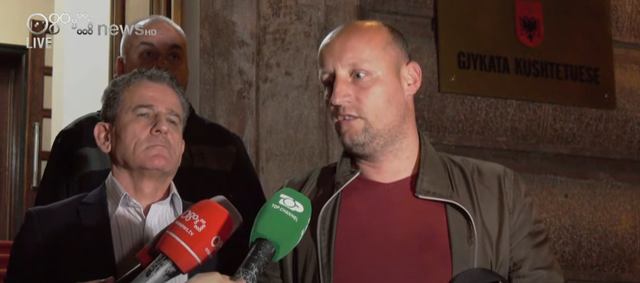
 Flash News
Flash News
Constitutional Court overturns SPAK ruling on 'Qyno' case: Journalist's right to protect source, constitutional guarantee

The Constitutional Court judges have 'overthrew' SPAK today, ruling in favor of journalist Elton Qyno in his lawsuit regarding the decisions of the Special Court for the seizure of electronic devices owned by him, the search of his home and the personal search following an investigation launched by SPAK to reveal investigative secrets.
In the lawsuit, Qyno sought the annulment of the decisions that led to these decisions, describing them as violations of human rights and freedoms.
Therefore, the court concluded that the controls interfered with freedom of expression and that the journalist's right to protect his source is one of the constitutional guarantees.
Recall that Ora News journalist Elton Qyno was questioned in December 2023 for leaking materials to the media from an investigative file for a series of serious crimes, while after a search of his home, the Prosecution seized his cell phones and electronic devices.
In November last year, the Special Court imposed the measure of "compulsion to appear" against him for the crime of passive corruption in the private sector, based on a proceeding registered by the Special Prosecution for the criminal organization led by Suel Çela.
MEDIA NOTICE
Today, on 22.04.2025, the Constitutional Court considered the case of petitioner Elton Qyno with the aim of annulling court decisions regarding personal, residential and workplace searches, as well as the seizure of items and computer data.
The court, after analyzing the preliminary criteria of the request, concluded that the requester is legitimate and has exhausted the legal remedies available only to challenge the decision that allowed the seizure of computer data, which was challenged by the requester all the way to the High Court.
As regards personal liberty, the Court found that this claim was not related to the decisions on the seizure of computer data. As regards the other claims, the Court considered that the applicant had not exhausted the available legal remedies.
As for the merits of the case, the Court focused on the analysis of the claim of violation of freedom of expression guaranteed by Article 22 of the Constitution and Article 10 of the ECHR.
Regarding this claim, the Court concluded that freedom of expression includes, among other things, freedom of the press.
The journalist's right to preserve the source of information and not to reveal it is one of the conditions of media freedom.
The protection of journalists' sources is one of the main guarantees of media freedom, as part of the constitutional freedom of expression, so ordering a journalist to reveal his sources may be contrary to the Constitution, unless there is a clear legal basis authorizing it and an overriding public interest that dictates it.
A journalist's right not to reveal their sources is not a privilege, as it essentially protects not only the freedom of the media, within the framework of freedom of expression, but also the public's right to information.
The court concluded that the court decisions, which allowed the seizure of computer data, interfered with the applicant's freedom of expression.
Regarding the criteria for limitation, the Court, applying the test of Article 17 of the Constitution, assessed that the interference was made by law and for a public interest.
However, within the framework of the standards set by the ECHR, the Court assessed that the interference with freedom of expression is not proportional.
In this sense, the Court also considered that the ordinary courts had not reasoned as to why obtaining the data necessary for the investigation could only be achieved through identifying the journalist's source, as a last resort, and why there were no other alternative means to achieve the same goal.
In this regard, the courts have not reasoned regarding the urgency in seizing the applicant's computer data.
For these reasons, the Court unanimously decided to annul the decisions on the seizure of computer data (the decision of the First Instance Court of Appeals No. 501, dated 13.12.2023 and the decisions of the higher courts that have left it in force).
Likewise, the Court also decided to accept the request for the destruction of all computer data seized with the above-mentioned repealed decisions.
Regarding the claim of violation of the right to private life, the Court considered it appropriate not to stop, as long as it found a violation of the applicant's freedom of expression, thus annulling the above decisions.
Latest news


Not only the body, swimming also helps the brain
2025-07-05 21:02:49
"Be careful with the water", Alimehmeti warns about the health risks of summer
2025-07-05 20:39:10
PSG beats Bayern Munich 2-0, advances to Club World Cup semifinals
2025-07-05 20:19:38

Two vehicles collide on the Elbasan-Peqin axis, drivers injured
2025-07-05 19:26:29

What does Zelenskyy have more than Zegjineja?
2025-07-05 18:45:26

Fiscal peace, but at a cost
2025-07-05 18:00:10
'Bankers' tax evasion, Chinese CEO and former director jailed
2025-07-05 17:39:21
Kyle Walker joins English club on two-year deal
2025-07-05 17:20:24
Two cars collide on the Saranda-Delvina axis, 4 injured
2025-07-05 17:05:29
Touching gesture! Liverpool will pay Jota's family's salary until 2027
2025-07-05 16:45:18
The zodiac signs that cheat most often
2025-07-05 16:25:53

"I asked for the dismissals", Dredha tries to soften Rama's 'blow' in Vlora
2025-07-05 15:48:49
Bomb threat in Parliament, prosecutor: It was a lie
2025-07-05 15:22:28

Bardhi: The recount revealed how greedy Zeqine Balluku is in stealing
2025-07-05 14:44:29
Knife wound on the secondary road Tirana-Durrës, perpetrator sought
2025-07-05 14:37:54
Tears and pain, Diogo Jota is escorted to his final home
2025-07-05 14:21:34
Success starts with yourself! Simple ways to invest in personal development
2025-07-05 13:58:50
Unlicensed firearms found in apartment, 50-year-old arrested in Lushnje
2025-07-05 13:43:11

Tirana Court remands Skerdi Sina to prison
2025-07-05 12:59:34
Cocaine laboratory in Greece, here are the Albanians arrested and wanted
2025-07-05 12:40:16
Directed Justice/Vangjeli: SPAK does not investigate any scandal involving Rama
2025-07-05 12:22:03

Bomb alert, Police remove MPs and media from Kosovo Parliament building
2025-07-05 11:48:16
"The will of the people" and the irony of ordered resignations
2025-07-05 11:32:05
Summer drowning risk: How to enjoy the water without risking your life
2025-07-05 11:20:27
Fire situation in the country, 16 fires reported in 24 hours, 4 still active
2025-07-05 11:07:04
Car hits pedestrian at white lines, injured in serious condition in Vlora
2025-07-05 10:59:58
Mosquito-borne diseases are a growing problem in Europe
2025-07-05 10:44:13



One of Sweden's most dangerous and wanted criminals arrested in Turkey
2025-07-05 09:38:29
Foreign exchange/ How much foreign currencies are bought and sold today
2025-07-05 09:18:38

"Don't be influenced by the opinions of others", today's horoscope
2025-07-05 08:40:50

Morning Post/ In 2 lines: What mattered yesterday in Albania
2025-07-05 08:02:07

Trump says he's ready to raise tariffs to 70% on some countries
2025-07-04 22:35:52
Tre shenjat e zodiakut që do ‘pasurohen’ në Korrik
2025-07-04 22:05:09
Gaza War: Hamas Accepts US Proposal for 60-Day Ceasefire
2025-07-04 21:50:10
Autocracy in Albania, Fuga: Governance has gotten out of control
2025-07-04 21:40:51
Meta: Agriculture on credit, the new fraud!
2025-07-04 21:26:39




Vote recount in Durrës ends without changes
2025-07-04 20:12:54
Gas station explodes in Rome, 25 injured (VIDEO)
2025-07-04 20:00:20

These afternoon habits often sabotage weight loss
2025-07-04 19:39:28
Former Arsenal player Thomas Partey accused of rape
2025-07-04 19:24:21
Shepherd disappears without a trace in Delvina
2025-07-04 19:14:31

Bardho gave Zegjine's mandate/Braho: Unfair! It violates the electoral system
2025-07-04 19:01:08


Rapid developments in the Sultanates!
2025-07-04 18:00:06



Italy tightens rules for skateboard traffic
2025-07-04 17:20:18

Unusual for the time, dense fog covers the coast of Vlora
2025-07-04 16:48:01


Accident on the Shkodra-Lezhë axis, one dead and 3 injured
2025-07-04 16:14:19
Albania with fewer requests for asylum and Albanian citizenship in 2024
2025-07-04 16:06:57

Albania last for quality of life, DP: Technical government is the solution!
2025-07-04 15:42:30
Nico Williams says "No" to Barcelona, signs with Athletic Club until 2035
2025-07-04 15:33:35
Fires in the country, four fires are still active, what is the situation?
2025-07-04 15:24:20

Summer brings big changes for these 4 zodiac signs
2025-07-04 15:00:04
Osmani: MPs need to agree to a secret ballot for the Speaker of Parliament
2025-07-04 14:51:09
Serious accident on the Peqin-Elbasan axis, two injured
2025-07-04 14:37:56

GJKKO leaves in force the security measure for the head of the KPP
2025-07-04 13:58:17
Who will replace Ilir Meta and take over the leadership of the PL?
2025-07-04 13:50:36
Berisha: Dismissal of directors in Vlora, another act of 'scapegoats'
2025-07-04 13:41:46




Librazhd/ In a serious psychological state, the young man consumes pesticides
2025-07-04 13:05:07


Weapons trafficked from Kosovo to Albania, two arrested, 8 pistols seized
2025-07-04 12:33:28
Konsumimi i tepërt i çokollatës, ja cilat janë dëmet që shkakton në organizëm
2025-07-04 12:23:35

Fires in the country, 21 fires in the last 24 hours, 4 still active
2025-07-04 12:00:19
WB calls for debt transparency: Albania to publish details of every loan
2025-07-04 11:50:05
